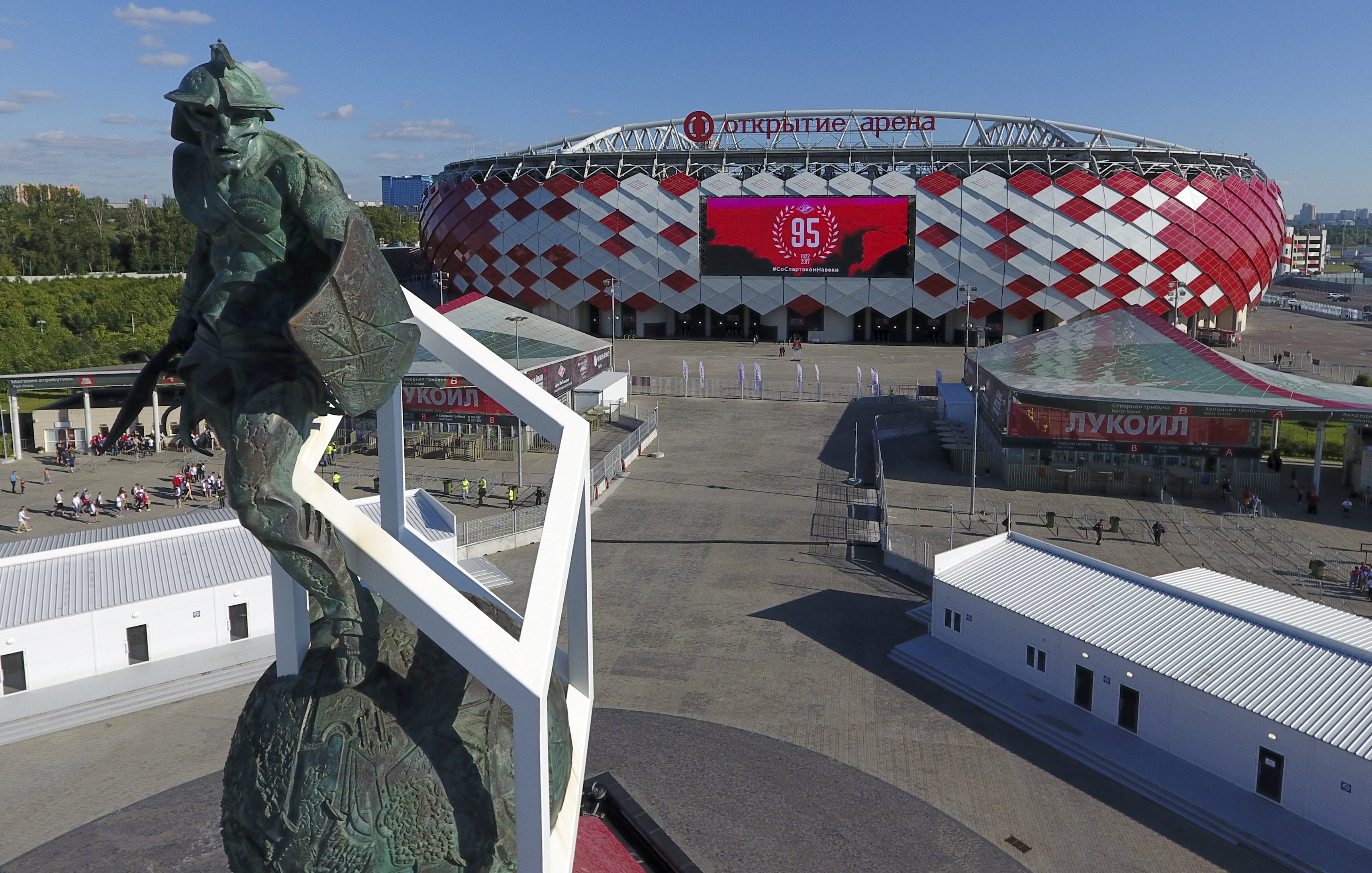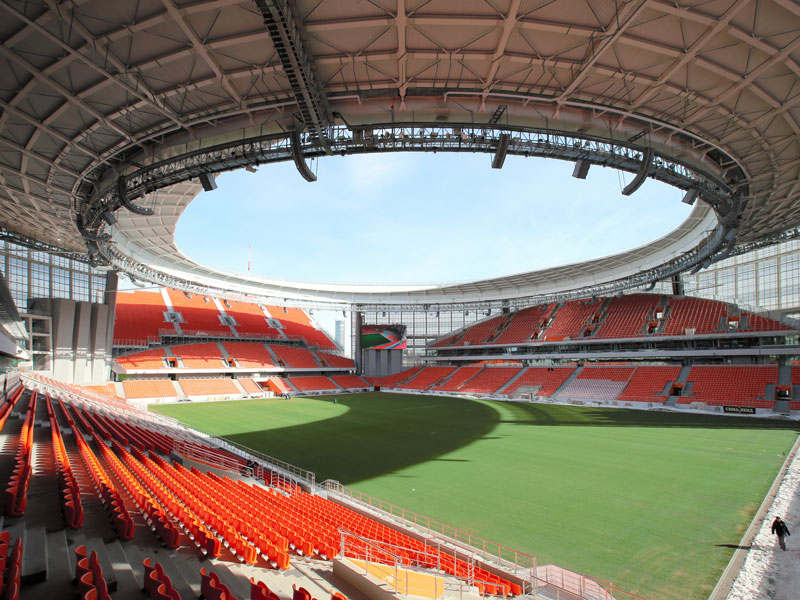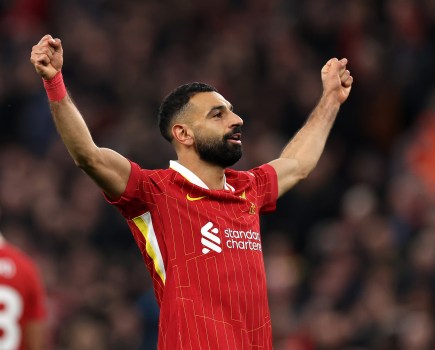World Cup Stadiums – Russia 2018
The 2018 World Cup will be held in Russia, with 12 stadiums hosting 64 games throughout the tournament.
Take a look at our guide for each of them below.
Also check out our World Cup TV Schedule page to make sure you know what games are being televised where.
1. Luzhniki Stadium, Moscow

Lenin: The Russian revolutionary Lenin stands outside the stadium (Getty Images)
Capacity: 80,000
Games: Russia v Saudi Arabia (14 June); Germany v Mexico (17 June); Portugal v Morocco (20 June); Denmark v France (26 June); Spain vs Russia Round of 16 (1 July); Semi-final (11 July); Final (15 July)
Background: Stadium wise, Luzhniki Stadium is the jewel in the Russian crown for the 2018 World Cup. Built in 1956, it has a long, illustrious history of hosting events, like the 2008 Champions league Final between Manchester United and Chelsea. Recently modernised, it will no doubt continue to be the home of the national side.
2. Otkritie Stadium, Moscow

Gladiator: The Spartacus statue will be a favourite amongst tourists (Getty Images)
Capacity: 45,360
Games: Argentina v Iceland (16 June); Poland v Senegal (19 June); Belgium v Tunisia (23 June); Brazil v Serbia (27 June); Colombia vs England Round of 16 (3 July).
Background: A statue of Spartacus outside the stadium will prove popular, and the home of Spartak Moscow will likely be a fan favourite in 2018. It was built for club football, so the stands are close to the pitch, and in terms of travel, it has its own metro station so it doesn’t take long at all to get into the city centre.
3. Nizhny Novgorod Stadium, Nizhny Novgorod

Striking: The Nizhny Novgorod design is sure to amaze (Getty Images)
Capacity: 44,899
Games: Sweden v South Korea (18 June); Argentina v Croatia (21 June); England v Panama (24 June); Switzerland v Costa Rica (27 June); Croatia vs Denmark Round of 16 (1 July); France vs Uruguay Quarter-final (6 July).
Background: With a striking design, Nizhny Novgorod promises to be one of the most attractive stadiums to look at out of the 12. After the tournament it will become home to Olimpiyets Nizhny Novgorod, a second-tier club.
4. Mordovia Arena, Saransk

Colourful: The Mordovia exterior is certain to give good pictures (Getty Images)
Capacity: 44,442
Games: Peru v Denmark (16 June); Colombia v Japan (19 June); Iran v Portugal (25 June); Panama v Tunisia (28 June).
Background: One of the smallest cities to host a match, Saransk was an interesting choice. The Mordovia Arena is not that stimulating either, but the brightly coloured exterior may produce some good photos. Local side Moldovia Saransk, currently in the third-tier will move in after the tournament.
5. Kazan Arena, Kazan

Kazan: The HD screen on the side of the stadium is a sight to behold (Getty Images)
Capacity: 45,379
Games: France v Australia (16 June); Iran v Spain (20 June); Poland v Colombia (24 June); South Korea v Germany (27 June); France vs Argentina Round of 16 (30 June); Brazil vs Belgium Quarter-final (6 July).
Background: Designed by Populous, the same company that designed Wembley and the Emirates, the Kazan Arena is home to Rubin Kazan. It is a modern stadium but will be one of the oldest stadiums at the tournament because of new constructions. Has previously held football and athletics events, as well as the 2015 World Aquatic Championships where the football pitch was replaced by swimming pools.
6. Samara Arena, Samara

Dome: The 65-metre dome is a defining feature of the Samara Arena (Getty Images)
Capacity: 44,807
Games: Costa Rica v Serbia (17 June); Denmark v Australia (21 June); Uruguay v Russia (25 June); Senegal v Colombia (28 June); Brazil vs Mexico Round of 16 (2 July); Quarter-final (7 July).
Background: Samara was once home to the Russian space-programme, and the 65-metre dome, when lit up, is sure to look spectacular. It has had countless delays and re-designs after soaring costs, and will also become home to Krylia Sovetov, who are due to return to the Russian top-flight next year.
7. Central Stadium, Yekaterinburg

Bizarre: Ekaterinburg Stadium has an odd design (Getty Images)
Capacity: 35,696
Games: Egypt v Uruguay (15 June); France v Peru (21 June); Japan v Senegal (24 June); Mexico v Sweden (27 June).
Background: The main aspect of note at Ekaterinburg are the temporary stands that sit behind each goal. Protruding outside of the stadium, FIFA introduced them to make sure the stadium is above the 35,000 required minimum. They will be taken down after the tournament and the stadium will be home to FC Ural, a mid-table team in the Russian premier League.
8. Krestovsky Stadium, Saint Petersburg

Expensive: St Petersburg stadium is thought to be one of the most expensive ever (Getty Images)
Capacity: 64,287
Games: Morocco v Iran (15 June); Russia v Egypt (19 June); Brazil v Costa Rica (22 June); Nigeria v Argentina (26 June); Sweden vs Switzerland Round of 16 (3 July); Semi-final (10 July); Third place play-off (14 July).
Background: The stadium took a decade to build, with huge costs too, but it is certainly spectacular. It hasn’t been devoid of controversy though, with the most significant being the allegation that 110 North Koreans were working there in atrocious conditions. Zenit St Petersburg will move in after the tournament.
9. Kaliningrad Stadium, Kaliningrad

Allianz: The Kaliningrad Stadium is designed to look like the Allianz Arena in Germany (Getty Images)
Capacity: 35,212
Games: Croatia v Nigeria (16 June); Serbia v Switzerland (22 June); Spain v Morocco (25 June); England v Belgium (28 June).
Background: Originally designed to look like the Allianz Arena, Kaliningrad Stadium had financial issues from the beginning. The company that drew up the plans went bankrupt so they were altered to have less capacity and a less expensive design. After the tournament it will be home to Baltika Kaliningrad, the local side who haven’t been in the Russian top-flight for years.
10. Volgograd Arena, Volgograd

Rotor: The Volgograd will become home to Rotor after the World Cup (Getty Images)
Capacity: 45,568
Games: Tunisia v England (18 June); Nigeria v Iceland (22 June); Saudi Arabia v Egypt (25 June); Japan v Poland (28 June).
Background: Shockingly, in 2014, it had to be searched thoroughly for unexploded ordnance after bombs from the Battle of Stalingrad but that has been the only real issue. Currently bottom of the second-tier, Rotor are expected to move in after the tournament.
11. Rostov Arena, Rostov-on-Don

Costs: The Rostov Arena scaled back its design due to spiralling costs (Getty Images)
Capacity: 45,145
Games: Brazil v Switzerland (17 June); Uruguay v Saudi Arabia (20 June); South Korea v Mexico (23 June); Iceland v Croatia (26 June); Belgium vs Japan Round of 16 (2 July).
Background: Built alongside the River Don, the Rostov Arena will supposedly be notable for its roof which imitates the meanderings of the river. FC Rostov will move in after the tournament has concluded.
12. Fisht Olympic Stadium, Sochi

2014: Fisht Stadium hosted the Winter olympics and Paralympics in 2014 (Getty Images)
Capacity: 47,659
Games: Portugal v Spain (15 June); Belgium v Panama (18 June); Germany v Sweden (23 June) ; Australia v Peru (26 June); Uruguay vs Portugal Round of 16 (30 June); Russia vs Croatia Quarter-final (7 July).
Background: Fisht Stadium was built for the 2014 Winter Olympics and Paralympics, so is clearly capable of hosting big events. Situated 18 miles outside of Sochi, it may be difficult to get to, but it is also one of the most dramatic stadiums in the tournament. The removal of its roof to comply with FIFA regulations also cost a lot of money.
[collection name=”small” accordion=”mobile” excerpt=8]
At World Soccer we will update you with all the news related to the World Cup on our website. Make sure you know about the Groups, Friendlies, Dates, Fixtures, TV Schedule, Qualified Teams by clicking on the highlighted links.
Also don’t forget to follow World Soccer on Facebook, and Twitter.







